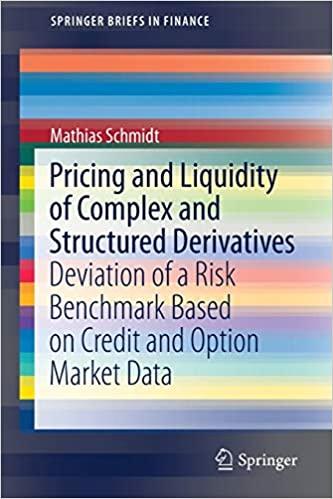Question
Business Snapshot 5.1 Kidder Peabodys Embarrassing Mistake Part 1: Writing Report (a) Describe in detail the cause, process, and consequence of the case. (b) What
Business Snapshot 5.1 Kidder Peabodys Embarrassing Mistake
Part 1: Writing Report (a) Describe in detail the cause, process, and consequence of the case.
(b) What can we learn from financial disasters?
Investment banks have developed a way of creating a zero-coupon bond, called a
strip, from a coupon-bearing Treasury bond by selling each of the cash flows under[1]
lying the coupon-bearing bond as a separate security. Joseph Jett, a trader working
for Kidder Peabody, had a relatively simple trading strategy. He would buy strips and
sell them in the forward market. As equation (5.1) shows, the forward price of a
security providing no income is always higher than the spot price. Suppose, for
example, that the 3-month interest rate is 4% per annum and the spot price of a strip
is $70. The 3-month forward price of the strip is 70e0.04*3>12 = +70.70.
Kidder Peabodys computer system reported a profit on each of Jetts trades equal to
the excess of the forward price over the spot price ($0.70 in our example). In fact, this
profit was nothing more than the cost of financing the purchase of the strip. But, by
rolling his contracts forward, Jett was able to prevent this cost from accruing to him.
The result was that the system reported a profit of $100 million on Jetts trading
(and Jett received a big bonus) when in fact there was a loss in the region of
$350 million. This shows that even large financial institutions can get relatively
simple things wrong!
(a) In describing the cause and process of the case, students should discuss the key persons, dates, and events. Graphs, figures, or tables can be included in the report with appropriate citations.
(b) In discussing the consequence of the case, students should discuss the impact of the financial disasters in relating to other participants in the financial market and their reactions. For example, peer firms, shareholders, regulators, and so on.
Step by Step Solution
There are 3 Steps involved in it
Step: 1

Get Instant Access to Expert-Tailored Solutions
See step-by-step solutions with expert insights and AI powered tools for academic success
Step: 2

Step: 3

Ace Your Homework with AI
Get the answers you need in no time with our AI-driven, step-by-step assistance
Get Started


